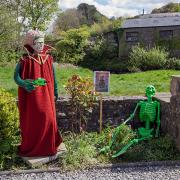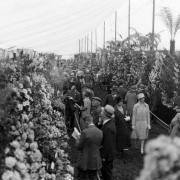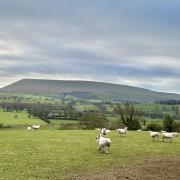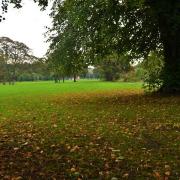A new generation of women readers are discovering a once-forgotten Lancashire novelist, writes Barbara Waite

When you think of women with a strong Blackburn connection do the names Kathleen Ferrier or Barbara Castle immediately spring to mind?
One writer who was as well-known as HG Wells, Somerset Maugham and JB Priestley in her day and spoken of as the new Jane Austen has for too long been quietly side-lined from the town’s list of famous names.
But now Dorothy Whipple, who topped the book sales lists in her day. is once again a best seller having being championed by women’s writing publisher Persephone Books.
Its founder Nicola Beauman came across Dorothy Whipple’s novels by chance when she was researching a book about inter-war women writers. ‘I admired and loved all the novels immediately and when I got the chance to set up a publishing house, she was one of the first writers we reprinted,’ she said.

‘Now she is our best-selling writer with a devoted following and her last novel – Someone at a Distance – which is my personal favourite, is one of Persephone’s ten classic books.’
Born 120 years ago, Dorothy Stirrup spent a very happy childhood in Blackburn and after her schooling went to work in the Education Office. Her close friend George Owen was killed in the first week of the First World War and putting this sadness behind her she married her boss, the Director of Education Henry Whipple.
He was 24 years older and a widower and although their life together was mostly spent in Nottingham and Kettering she used her ‘beloved home county’ as an integral part of some of her stories. High Wages is a perfect example extolling the Lancastrian values of getting on by hard work, a stubborn streak and an innovative eye.
This shop-girl-made-good story – set in a town based on Preston - would have appealed to readers in a county where cotton was king and Dorothy cleverly wove in local food and places – Bury simnel cake, tripe and parkin and the delights of Manchester, St Annes and Blackpool in their heyday.

Like Victoria Wood or Alan Bennett, she had an ear for dialect and collected overheard conversations to add a touch of authenticity and humour to her books which covered changes in society with a light touch.
Dorothy set High Wages in the years just before World War One, a time when Mr Selfridge’s revolutionary ideas of elegance and service were on offer in London but had not reached the provinces. Through the twists and turns of the plot, the heroine’s climb up the retail ladder is a fascinating history lesson for any reader interested in dressmaking and clothes.
Through all of her books her characterisation of men is equally as good as the women, so that in Blackburn there were people who assumed her husband must have written her books for her! In all, she wrote eight books and three volumes of short stories and was an extremely popular writer in the 1930s and 1940s when her gift for story-telling was appreciated and she rubbed shoulders with the big names of that time. But her last novel in 1953 – Someone at a Distance - had no reviews and did not sell.
She had simply dropped out of fashion. ‘Her stories were presented in such a subtle and understated way, that she was thought of as too simplistic and old-fashioned,’ said Nicola.

But of late there, has been a revival for her page-turning tales. ‘Since that first book we have reprinted five of the other novels, a book of short stories and she is included in Persephone’s 100th book collection of short stories too. It would be no exaggeration to say that Dorothy Whipple has become many of our readers’ favourite writer,’ she added.
Other themes she tackled were the destructive power of money – They Knew Mr Knight – and three aspects of marriage in They were Sisters - which were both made into films. Dorothy was in the Gaumont Theatre in London’s Haymarket for the world premiere of They were Sisters, which starred James Mason as a chillingly cruel husband.
Another book, Greenbanks, features a very modern relationship between gran and granddaughter; the destruction of a happy marriage in Someone at a Distance and the triumph of love over adversity in The Priory.
‘The most frequent remark made by Persephone readers is “I could not put it down.” Again and again they say that they could not understand why, but they could not stop reading,’ adds Nicola.
Dorothy, who spent her last years back in Blackburn, would be delighted to know her novels were still striking a chord with women in the 21st century and there’s good news for fans - there are two or three more books in the pipeline to keep her top of the sales charts.
Whipple’s world
Dorothy Stirrup was born at 9 Edgeware Road, off Revidge Road, Blackburn in 1893 the second of eight children, six of whom survived. A blue plaque on the house marks the event.
Her mother Ada was the daughter of William Henry Cunliffe the head of a decorating, gilding and engraving company who worked on many of the grand houses in the area. Her father Walter was an architect and land agent who was born in Eccleshill.
The family, plus their servant, lived at Elm Bank on St Silas’ Road and the Hawthorns on Duke’s Brow and she was educated at Miss Barrett’s private school, the High School and then the Convent of Notre Dame.
Dorothy had had a story published in the Blackburn Times as early as 1905. After school she went to work in the Education Office where she became secretary to the director Alfred Henry Whipple who she married in 1917.
When he died in 1958 she moved back home to spend the rest of her days in Whinfield Place. She died in of a stroke in Blackburn Royal Infirmary in September 1966.



























